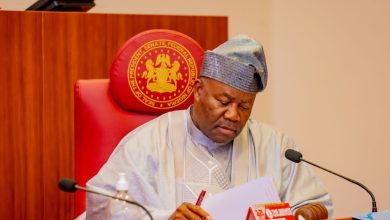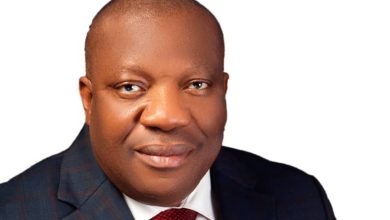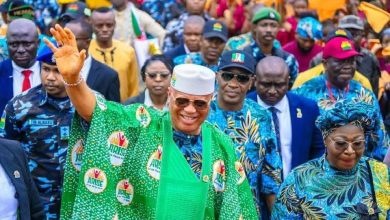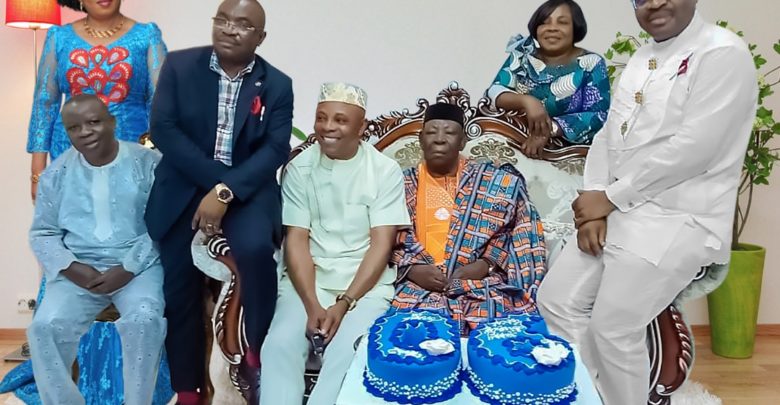
“Carve your name on hearts, not tombstones. A legacy is etched into the minds of others and the stories they share about you” – Shannon Alder
Elder Gabriel Nkanang was born on 27th May 1929 into a family deeply committed to scriptural ethics. Through his parents’ but predominantly by early engagement with the missionaries and buoyed by determination, he “discovered” the need and purpose for a good Christian life. Clearly, the resulting influence of his early exposure to Christian doctrine, cultural etiquettes, western education and eschatological knowledge founded his philosophies, defined his disposition and established his identity. To that end, he regarded himself as a thespian in God’s domain, acting a script written by God Almighty as enunciated in the gospels according to Jeremiah 1:5 and Romans 8:29-30: “Before I formed you in the womb I knew you, before you were born I set you apart and I appointed you as a prophet to the nations” and “for those God foreknew he also predestined to be conformed to the image of his Son… And those he predestined, he also called; those he called, he also justified; those he justified, he also glorified”.
RELATED: We’ll Miss Our Father’s Monthly Blessings, Wise Counseling -Gabriel Emmanuel Nkanang Jnr
God set Pa apart, appointed him to nations, He predestined him, and at 90 years of age, God called Pa again just so he could be justified and glorified in Him.
An embodiment of knowledge, untainted virtue, and a learner-par-excellence, Pa was an educationist, a retired headmaster, a teacher with steady gait, dexterous hands and razor-sharp mind. Pa was unassumingly very good at making concrete even the most abstract of situations. Until his transition he was a community leader and an elder of the United Evangelical Church (UEC) founded as Qua Iboe church.
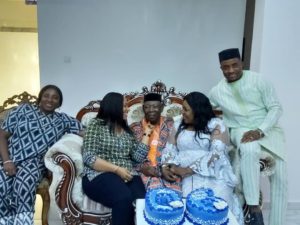
He achieved by forfeiting whatever was possible but so long as such sacrifices do not impinge his ideology, religious believes and the sanctity of life; it goes, without saying that for centuries to come, kindred generations after generations will continue to relish the man who laid the foundations for his immediate constituency, set sustainable benchmarks and obliged the ‘soft-blocks’ for collaborative and collective engagements as they relate to the individual, the other person(s) and the society acting either separately or collectively.
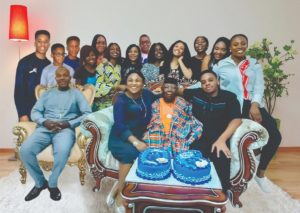
His clear priority was to consolidate the achievements of those before him, replicate the positives of advancements in other climes and leverage education to achieve the whole-man. Pa fully understood that without these ingredients, it would be difficult, if not impossible, to institute, nurture and sustain any advancement that may ensue in the course of efforts at improving lives and living.
Pa conscientiously toiled to see that communions were built by both the ‘haves’ and the ‘haves-not’, with a stern believe that that way, there was bound to be no losers and all gainers in the community’s equation. Even flinching at him, as it’s usual with people, did very little to affect his resolve on the deportment against injustice, social ailments and his support for knowledge-seeking and education as enablers, accompaniments and stimuli to the development of people and their ecosystems.
Pa’s temperament, on several issues, had evolved from experience especially in the aftermath of the loss of his father at a very momentous point in his life. As a sequel, he constantly persuaded himself that empathy and communalism could easily be the most effective plusses of founding a strong, virile and progressive society so long as one is able to see the opportunities in adversities and treat challenges as a call to more action. Consequently, his acts of leadership and service were irrevocably anchored on a resilience, forbearance, consideration, magnanimity and a realization that the past, even the present, most times do not solely determine the future. He often said, there is more wisdom for the discerning in the ‘letters’ of the Master’s charge to his workmen to let both the wheat and the terse grow together until the harvest (Mathew 13:30).
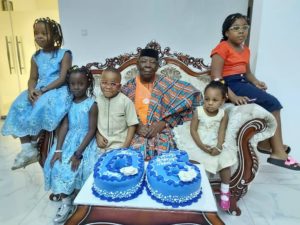
Pa led from the front, through his direct participation and presence and, he was well-aware of the dangers of the personality cult and how it could mislead people into overestimating certain individuals and underestimating themselves. He always inferred that the leader’s power, efficacy and relevance are based on the quality of his people. Subsequently, he gave confidence to people who were conditioned into submission by the superfluous modesty imposed by circumstances, and he helped them to replace and establish their dignities and self-respect mostly through canonical declarations and an infectious belief in the future. His moral authority and concern for the truth fueled the fires of his forte and pledge to the common good till his transition. Added to his moral influence and leadership, was a consummate saintly man, who realized and acknowledged his frailties and upon that made provisions for the downsides of others: Pa was simple and humble enough to admit mistakes and take responsibility for his actions and inactions. Pa was very chivalrous, to virtually everyone, irrespective of status, station or age with a particular interest in the challenged, under-served and those who live on the edge of society.
Pa was very much a man ahead of his time. He was impatient with achieving yet calculated, abstract yet concrete, had an unusual craving for knowledge, with a very huge commitment to his family, people and society. Pa may have been a man of inflexible ideals and ideas caught in a web of strange, unexplained and, in his view, adroit methods of doing things, he was, nonetheless, considerate and impassioned with the products on his unwavering admonitions.
Pa kept a disposition about leading and leadership as “ultimately about creating a way for people to contribute to making something extraordinary happen”. He regularly challenged the myth which professes leadership as something that is found only at the highest echelon of society by inspiring people to perform and take responsibility for their actions at all levels; he acknowledged leadership as an attitude that attracts both a debit and a credit and whilst the credit should be appreciated and celebrated, the debit must be recognized and attributed. Pa worked, ceaselessly, to foster and preserve the attributes of cohesion, trust, and obligation even amongst strange bedfellows.
For Pa, integrity was not an accidental feature. He was consistent in both his integrity and style. Pa was an utterly sincere leader with his actions typically matching his words. He practiced what he preached and applied standards even-handedly, because of their essentiality for discipline, morale and mission enablement. Pa always talked about the non-negotiability of integrity with an anecdote about a farmer who had a tall, majestic-looking tree growing next to his house: One morning the farmer saw a squirrel run up the side of the tree and disappear into a hole. Curious, the farmer looked into the hole and discovered that the tree he had always admired for its apparent grandeur was hollow inside and at the verge of falling on his house. Pa insisted integrity was not about embellishments, make-ups or make-beliefs and must flow inside-out. Added to integrity, he preached simplicity, discipline and character.
One cannot but be profoundly impressed by Pa’s acuity, his body-language prowess and his ostensible inclination to take positions that rise above constricted prejudices. Pa hated the vast deceptive gorge between implied and actual views as, in his view, it serves as an allegory for stalemates.
Because indulging in exaggeration, bandwagon pandering, and self-serving obscuration were never in his character, Pa insisted that prodigious impasses can be broken with sufficient goodwill, aptitude and vigor and according to him, it has nothing to do with the rich, the poor, the young or the old or whatever classification or categorization that may be applied.
He was a personality with a very high propensity for trusting and he believed the inherent willingness of people to give their best for the common good is a function of opportunity, trust, motivation, empowerment and taking responsibility without fear of aspersions. His usual ‘chorus’ was that those who are more successful in life are those that have had the most opportunities, realized it and took advantage and not those who are necessarily more gifted or more brilliant. Even more, he would say, “the race is not to the swift or the battle to the strong, nor does food come to the wise or wealth to the brilliant or favour to the learned; but time and chance happen to them all”.
Perhaps, one of Elder Gabriel Nkanang’s most important traits was his resilience or adversity quotient: Pa had an unusual ability to deal with adversities in his life with a mood that infers adversity as part of existence and explains that those who desire to avoid adversity are in effect trying to avoid life.
However high Pa rose, he was never contented to sit in a command position remote from the ‘theatre of action’, but went to see for himself, especially when all appeared to be going awry. He continually embraced and overcame challenges (he saw them as energizers) in the various forms they came for which reason he was said to have lived life fully: Lived for God, lived by God and left to God.
THE FAMILY VALUE
Pa said in his tribute to our late mother, Deaconess Emily Nkanang; “she never hesitated on reflection and never on account of inherent danger shrank…her courage was gained by habit…her strength lied not only in her belief in deliberation and consultation, but also in knowledge gained by relying on other people’s strengths, scriptures and learning from the mistakes and experiences of others”
Inferentially, ease of adaptability to change, ability to harness available resources, contemplation, consultation, and awesome courage to adopt or adapt are, clearly, essential guiding values of the Nkanangs’.
Different people have varying interpretations of family value irrespective of whether they are priests or pirates, paupers or princes, Knights or rogues. Elder Gabriel Emmanuel Nkanang as the patriarch of Nkanang family defined the how and what of the family and this involved the ideals of how they family aspiration to excel and how such aspirations impact other people and the society at large. Inter alia, these values include, but are not limited to, honesty, trustworthiness, courage, resilience, value-addition, taking responsibility and above all, leaving/giving all to God Almighty.
Elder Gabriel Emmanuel Nkanang is survived by six children, twenty-two grandchildren and six great grandchild who are the extant and emerging custodians and advocates of the family values.
Elder Gabriel Emmanuel Nkanang’s persona, evidently, creates a strong appeal for the old and young as well as upcoming families and is an expressive testament to a life of commitment, sacrifice, empath and love and emblematizes all the accoutrements of a life lived for, by and with God.
Pa’s earthy sojourn ended at about 4:30am on December 1, 2019 and until he transited in his sleep after an evening exchanging banters with everyone around him, he carried a smile and infectious hope, one of which was to spend the 2019 Christmas holiday with family members in Awa-Iman; God overruled him and opted that Pa spent the Christmas at His bosom.


